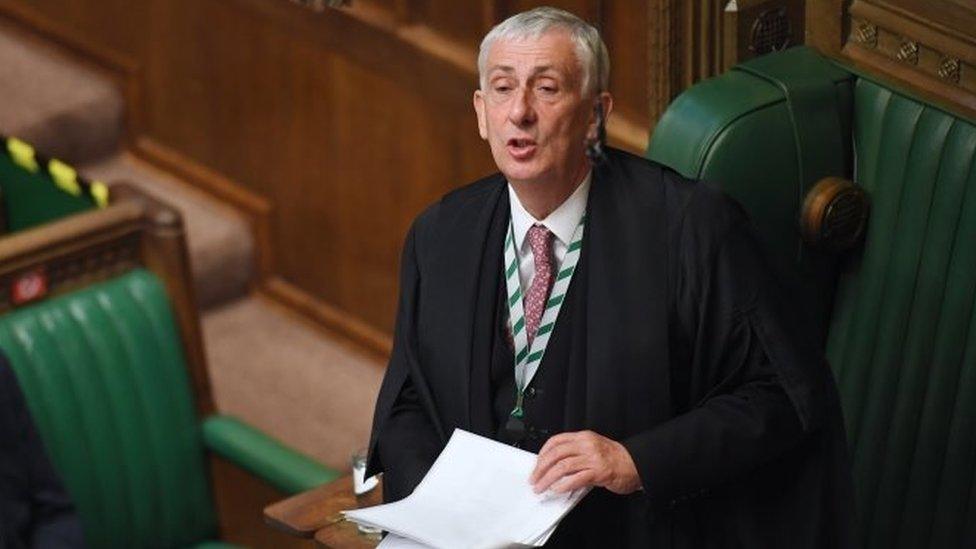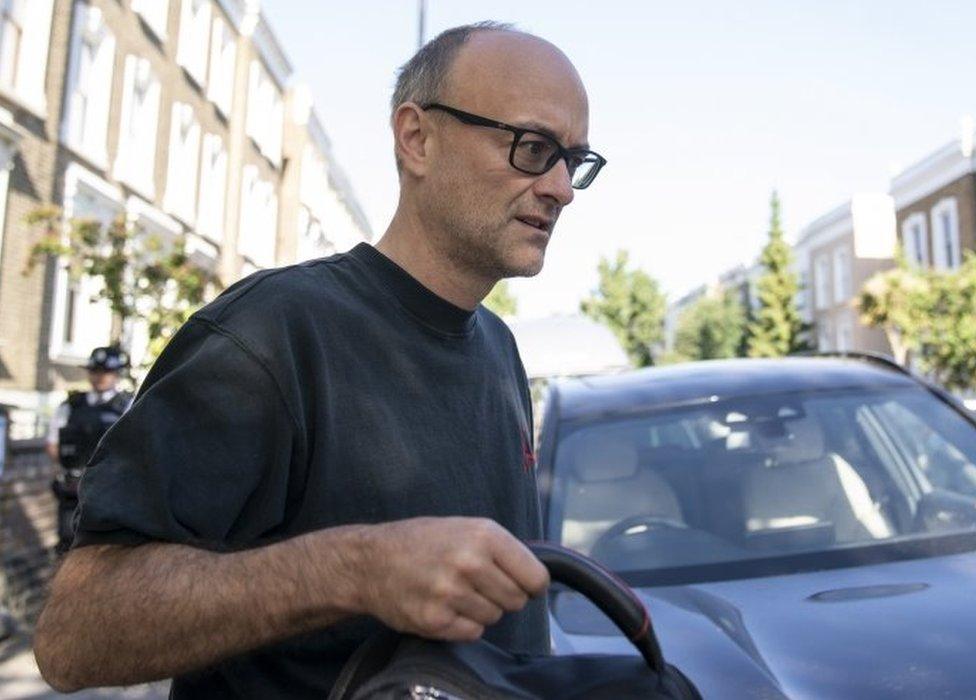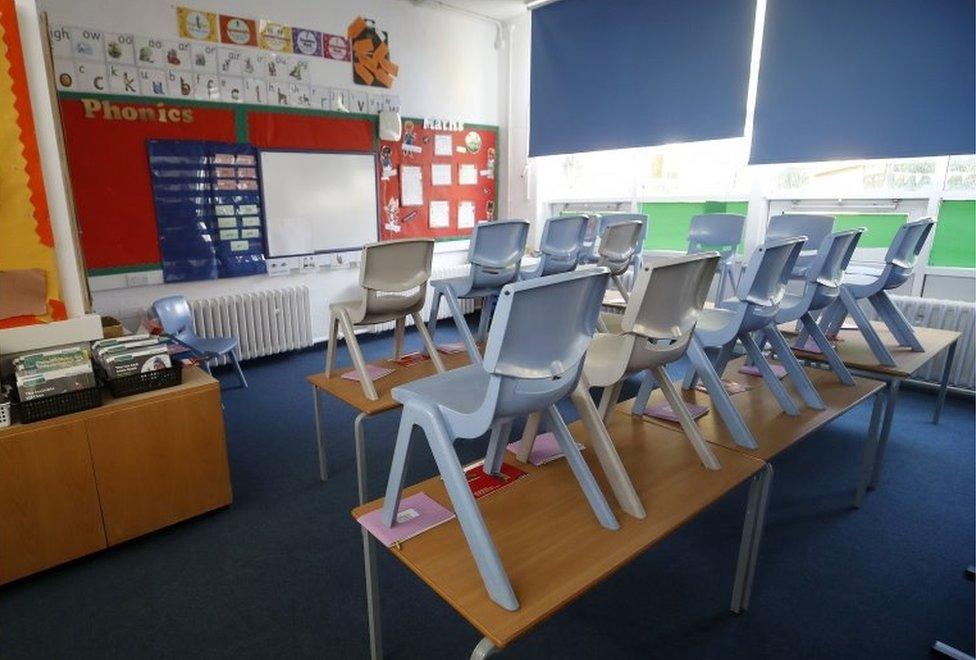The week ahead in Parliament
- Published

The Speaker says he won't allow MPs to crowd in to the chamber
The House of Commons that resumes business on Tuesday will be neither virtual, nor normal.
After several weeks when MPs were actively discouraged from attending Westminster, they will be back, but the strictures of social distancing will mean normal parliamentary socialising - chats in the Tearoom, coffee-filled gossip sessions in Portcullis House, meals in the Members' Dining Room, and all the rest, will still not be possible.
Mr Speaker Hoyle has already made clear that he will not permit a crowded chamber, either. So the atmospherics will be a bit weird and MPs may feel more isolated in the Covid-19 Parliament than they ever did participating from home.
The first business will be to find some kind of middle ground that allows MPs to perform one crucial function - voting - while avoiding the dangers of infection posed by their normal method of trooping through the division lobbies.
To this end, the government has recalled the House a few hours early to debate the issue, although, as I write, no motion has emerged.
Depending on how long those deliberations take, this manoeuvre could have knock-on effects on the rest of the week. The early recall (an 11:30, rather than 14:30 start) means the business previously set down is lost, starting with Justice Questions, which are definitely cancelled, and possibly extending to the Parliamentary Constituencies Bill, although it could be put back again, if there is time for a Second Reading debate.
If not, there could be a cascade of rescheduling through the rest of this short Commons week - so the programme described below is subject to change.
And there is quite a lot of important law-making to get through, including emergency legislation to protect Covid-19-hit companies from their creditors, due to be rushed through on Wednesday, and a very important measure to help the courts, by tidying up the hopelessly confused law on sentencing.
Of course, there will doubtless be major statements from ministers on the pandemic and its ramifications, and possibly something on the ominous state of affairs in Hong Kong. Plus a goodly helping of important committee hearings, not least a fascinating-looking session of the Treasury Committee, with three former chancellors giving their view on what their successor should do. Bring popcorn...
Here's my rundown of the week ahead.
Tuesday 2 June
The Commons is back, earlier than usual (11:30) and will plunge straight into considering a motion on its method of voting. Nothing has been published yet, but the word is that the government is insisting that voting must be restricted to those physically present, while nodding to Mr Speaker's insistence that the advice of Public Health England, that the normal process is unsafe, must be respected.
This makes no concession to those MPs unable to attend during the pandemic, although, if they are no longer to be permitted to vote remotely, it may be that opposition parties will press for them to be allowed to use the proxy voting system already available for pregnant MPs. It seems highly likely there will be opposition amendments of some kind.
There will be considerable pressure to reach all-party agreement on the solutions, but the atmosphere is more than a little unpromising, because opposition parties were annoyed by the way the government forced through the ending of the virtual parliament.
So what if there is no agreement? MPs could be in the awkward position of having to vote on how they should vote, before having agreed a safe method of voting, which may require Mr Speaker to step in and ordain a safe voting method on his own authority.
The Speaker's role is so shrouded in custom and practice that he would be able to do this.

MPs could have a bit to say about Dominic Cummings
And keep an eye on the politics of this vote. This is House rather than government business, and it may provide an opportunity for Conservative backbencher angry at the Cummings affair (60-plus have called for the PM's adviser to go) to blow off a bit of steam and signal that they should not be ignored.
It is certainly possible for ministerial statements to be taken on a Recall day - I'm not so sure about Urgent Questions.
All this will probably still leave time for consideration of the Parliamentary Constituencies Bill, which finally kills off the Cameron government's attempt to cut the number of MPs from 650 to 600. It was based on the complaint that Labour seats tended to have smaller electorates than Conservative ones, skewing the electoral system in Labour's favour.
This has been stalled since the Lib Dems joined Labour to block the new constituency boundaries needed, and has always been unpopular with the troops. Labour has an amendment down to oppose the bill, even though it welcomes the move to keep 650 MPs.
Its complaint is that the rules on constituency size are too inflexible and that attempting to base boundaries on the next electoral register would mean using an incomplete list, thanks to the pandemic.
On the (still virtual) Committee Corridor, Public Administration and Constitutional Affairs (09:30) takes evidence on how to remove another constitutional legacy of the Cameron years, the Fixed-Term Parliaments Act, with evidence from academic experts, while Justice (14:30) has a series of panels giving evidence on the impact of the pandemic on the courts, prisons and probation service.
In the Lords (11:00) questions to ministers cover removing the five-week wait for Universal Credit payments (a subject that may be raised with Work and Pensions Secretary Therese Coffey when she appears before the Lords Economic Affairs Committee at 15:00) and free TV Licences for over-75s. The main legislating is the detailed committee stage scrutiny of the Telecoms Infrastructure (Leasehold Property) Bill.
Wednesday 3 June
The Commons opens (11:30) with half an hour of Welsh Questions, followed by half an hour of PMQs - where the Covid-era solemnity may break down a bit as MPs get their first chance to tackle the prime minister about the Cummings affair. Mr Speaker will be continuing to limit attendance in the chamber, but, even so, noise levels may increase.
The day's ten-minute rule bill, from Conservative Fiona Bruce, aims to amend the 1967 Abortion Act to exclude correctable conditions like cleft lip, cleft palate and clubfoot as qualifying physical abnormalities for the purposes of medical termination of pregnancy.
Then comes the day's main business, the rushing through of the Corporate Insolvency and Governance Bill. This includes a series of long-term reforms that had been in the pipeline before the pandemic, but the main focus now is a series of measures to provide temporary protection for otherwise viable companies hit by the pandemic - it suspends parts of existing insolvency law.
It gives companies that are insolvent or in danger of insolvency a 20-day moratorium to allow them to seek new investment and restructure, subject to supervision by a "monitor" who must certify that the company could be rescued as a going concern. There will be restrictions on winding-up orders and aggressive tactics by landlords.
On the Committee Corridor, the Treasury Committee (14:30) ponders the economic impact of the pandemic with the aid of Lord Darling, the last Labour Chancellor, George Osborne and Philip Hammond. This should be interesting from a number of points of view, and may provide a useful glimpse of the economic medicine that may follow the pandemic.

MPs are examining the impact of the pandemic on education
I imagine an early questions will be about the PM's comments before the Commons Liaison Committee, ruling out income tax rises or an end to the "triple lock" on the state pension.
My eye was also caught by the Education Committee session (09:30) on the impact of the pandemic on education and children's services.
In the Lords (11:00) questions to ministers cover the impact of the pandemic on local democracy, and the timings, chair and terms of reference of the proposed Royal Commission on Criminal Justice - that's from the former Chief Inspector of Prisons, Lord Ramsbotham.
The main business is the continued committee stage scrutiny of the Private International Law (Implementation of Agreements) Bill. This deals with the process for adjudicating disputes between individuals in different countries, notably over child custody, and is shaping up to be pretty controversial. The snag at the moment is that the Lords do not yet have an online voting system in place, so it may be a while before they can move beyond the "shadow boxing" phase at Committee, and hold actual votes at Report Stage.
Thursday 4 June
The Commons day opens (09:30) with 40 minutes of Digital, Culture, Media and Sport questions, followed by a mini-question time for Attorney General Suella Braverman. And then the Leader of the House, Jacob Rees Mogg, will announce forthcoming Commons business.
Then comes a rather technical-sounding, but highly significant measure, the Sentencing (Pre-Consolidation Amendments) Bill. This is a measure which paves the way for the new sentencing guidelines created by the Law Commission to be put into action, finally sorting out the massively confused law on sentencing in the courts.
This is Secret Barrister territory, an area where the legal system is deep in the mire, and a huge chunk of cases sent to the Appeal Court are to sort out mistakes in sentencing by judges mired in complex and conflicting law.
As a Law Commission Bill, this is subject to a special fast-track process involving a joint parliamentary committee, to speed it onto the statute book.
Then comes an interesting parliamentary curiosity, a 90-minute debate under Section 13A of the European Union Withdrawal Act, on a motion from Sir Bill Cash and the European Scrutiny Committee, calling on the government to report back to MPs regularly on the progress of the "future relationship" talks with the EU.
The European Scrutiny Committee has produced a report which sums up the concerns of all the select committees about their aspects of the talks - and the motion simply asks ministers to respond to them. But there's always the chance of an amendment, for example, calling for an extension the transitional period before the UK leaves the EU Single Market.
The day's committee hearings include Business, Energy and Industrial Strategy (09:30) looking at the impact of the pandemic on business and workers, and the Digital, Culture, Media and Sport Sub-Committee on Online Harms (looking at the proposals in the government's Online Harms White Paper) quizzes witnesses from Facebook, YouTube and Twitter (14:30).
The other interesting committee action is the opening of the committee-stage consideration of the Domestic Abuse Bill (11:30 and then 14:00. These are the early hearings involving evidence from witnesses, before the process of line-by-line consideration kicks in, and there has been some controversy over the refusal to allow victims of domestic abuse to give evidence remotely.
This is now routine for select committees, but no provision has been made for public bill committees to do the same.
In the Lords (11:00) question time includes Baroness Benjamin asking about how 18-to-25-year-olds can be prevented from becoming online child sex predators.
The main debate is on the economic lessons of the pandemic, and has attracted a healthy 57 speakers, including former Chancellor Lord Lamont and former Home Secretary Lord Blunkett.
There's also a short debate on the situation in Hong Kong, and the impact on human rights of the Chinese government's new national security legislation.
